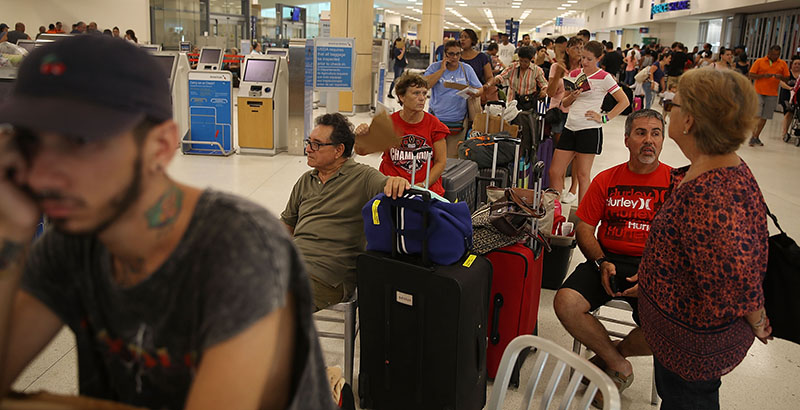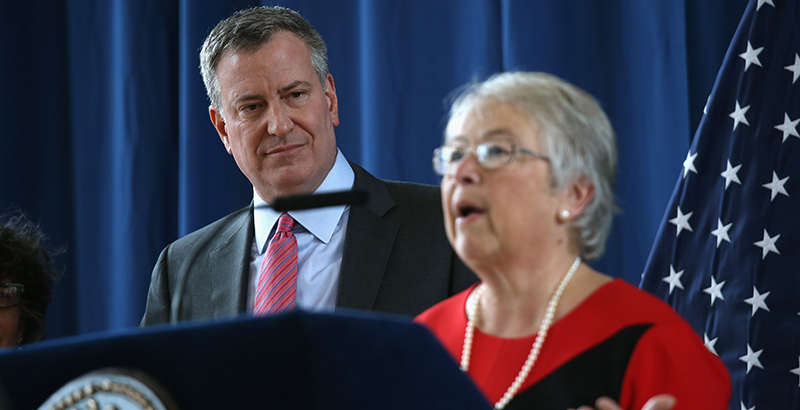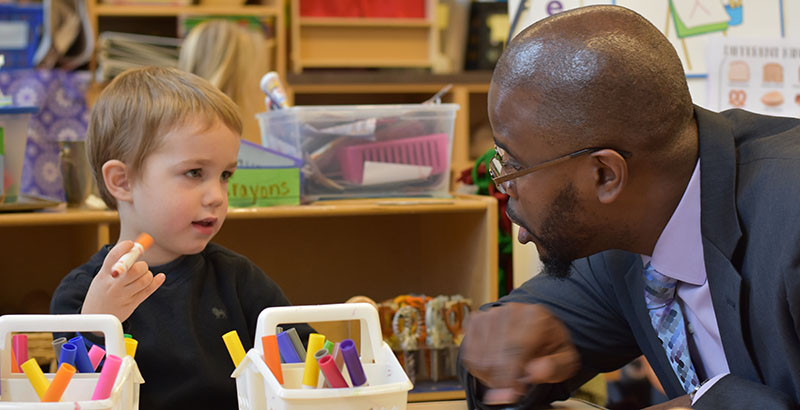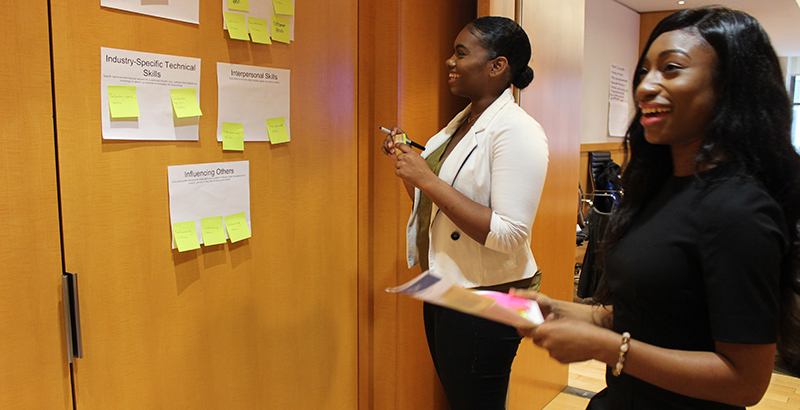We’ve rounded up our 13 most popular and buzzed-about stories (and videos) of the month. Get these monthly 74 highlights, as well as our weekly picks for the day’s top education articles at other outlets, delivered right to your inbox — sign up for The 74 Newsletter.
How One of Indianapolis’s ‘Innovation School’ Principals Is Using Language of Love — and Spanish Immersion Program — to Achieve Dramatic Student Growth
INSPIRING: As part of our special coverage tied to Reinventing America’s Schools, David Osborne’s new book on educational innovation that we’ve published in part at our special microsite, Kate Stringer profiled Global Preparatory Academy in Indianapolis, where language immersion — and a culture of love — doubled test scores.
It bothered Principal Mariama Carson to watch her students say “goodbye” to their parents in Spanish as they headed into class and then not speak their native language for the rest of the day. So at her new “Innovation School,” staff and parents call each other “familia.” “I never see my kids here deny their language or their culture, ever,” Carson said. Read about how her new model is doubling student scores and turning around a school where more than 90 percent of students failed state tests.
Rotherham: Matt Damon Seems Blissfully Ignorant of Many Things. So Why Should We Listen to Him on Schools?

SCHOOL CHOICE: Actor Matt Damon is front and center in a new documentary opposing school choice. But senior editor Andy Rotherham questioned whether the depth of his knowledge about schools equals his awareness of the sex scandal currently embroiling Hollywood — about which he professed to know nothing. Rotherham’s question: Would you take school advice from this man?
Porterfield: When Public Charter School Alumni Thrive in College
OPPORTUNITY GAP: Six years ago, Franklin & Marshall College in Lancaster, Pennsylvania, began building relationships with many of the country’s top-performing public charter schools, access programs, scholarship programs, and district schools. As a result, F&M has tripled the percentage of incoming Pell Grant students while more than doubling the percentage of incoming students of color. Most years, its Pell Grant students have posted the same or higher grades, first-to-second-year retention rates, and graduation rates as other students.
These statistics, F&M President Daniel Porterfield wrote, represent real victories and real students, like those Porterfield knows at F&M — and they became even more inspiring when he reflected upon how those students’ futures have been transformed by the quality pre-college educations that set the trajectory for their success at a rigorous national liberal arts college. Watch Porterfield and students in F&M’s summer college prep program talk about closing the opportunity gap.
Puerto Rico Teachers Fleeing Hurricane Maria Arrived at Orlando’s Airport With Nothing. They Left With Jobs
HURRICANE MARIA: As school districts across the East Coast braced for an influx of thousands of Puerto Rican students displaced by Hurricane Maria, Orlando, Florida, had a message for teachers from the island: We’re hiring.

As Mark Keierleber reported, Orange County Public Schools, which includes Orlando, set up shop at the airport to help displaced parents enroll their children in schools — and extended job offers to displaced Puerto Rican teachers right there in the terminal. “When they get off the plane, they’re told that there’s some assistance, that there are a group of people downstairs waiting for them,” said Bridget Williams, the district’s chief of staff. “To see the look on their face when they walk into the room, and to see a room full of individuals that are there to help, is powerful. Just the look on their face.”
Additional coverage:
- Miami School Psychologist Helped Puerto Rico Educators Prepare for Student Trauma
- Florida Schools Seek More Funds for Influx of Displaced Students
Exclusive: Documents Show NYC’s Education Department Failed to Answer 526 Public Records Requests Over Past 3 Years
FREEDOM OF INFORMATION: In April 2016, The 74 requested information about all open public records requests submitted to New York City’s Department of Education. The arrival of these documents — which took 16 months — provided a snapshot of the department’s resistance to providing a wide variety of records, as mandated by state law.

David Cantor presented the findings: Hundreds of requests from parents, lawyers, vendors, and reporters have gone unanswered for years on end. And he raised questions about whether the list provided by the city is, in fact, complete. Missing from the list was a 2011 request that a Teachers College professor reported was never fulfilled.
Senate HELP Democrats Continue to Sound Alarm on Weak ESSA Implementation
ESSA: A hearing before the Senate Health, Education, Labor and Pensions Committee was meant to focus on how the Every Student Succeeds Act was driving state-level innovation, but committee Democrats had other things on their mind, as Carolyn Phenicie reported.

Ranking Democrat Patty Murray said ESSA was supposed to balance state flexibility with federal guardrails protecting vulnerable student groups — the disabled, English language learners, low-income children, and minorities — but the balance had tipped too far away from accountability. And Sen. Elizabeth Warren said congressional Republicans’ decision to roll back Obama-era accountability rules “made implementation of this law extremely partisan for no reason that I understand.”
74 Interview: D.C. Schools Chancellor Antwan Wilson on Closing the City’s Achievement Gap and How His District Is Unlike Any Other in America
WASHINGTON, D.C.: A decade after schools in the nation’s capital instituted sweeping reforms, responsibility for continuing that progress, while getting at continuing disparities across the city, now falls on Antwan Wilson, who began his tenure as chancellor in February after leading the Oakland, California, schools.

In a 74 Interview, he spoke with Carolyn Phenicie about the city’s new strategic plan, his experience in Washington nine months in, and creating safe and welcoming spaces for all students. “What we’re trying to get at in our strategic plan,” he told her, “is trying to say, ‘Look, we have to have a bar of excellence. Excellence is in academics, it is in the service we provide … while focusing heavily on equity and love.’ That’s it.”
5 Lessons Other Districts Can Take Away from Latest Rand Personalized Learning Study of Small High Schools
INNOVATIVE SCHOOLS: Personalized learning can be difficult to define and even harder to quantify. But recent studies have begun to identify key elements and strengths of successful personalized learning approaches.

The latest entry, the RAND Corporation’s “Designing Innovative High Schools,” reports on progress observed in 10 small high schools from Denver to Providence that combine intensive social-emotional learning with individualized instruction. Among the early findings are observations regarding barriers to the full implementation of personalization, including a shortage of high-quality curriculum and teachers eager to embrace the model. Five quick takeaways from Beth Hawkins.
Bridging College and Profession: Inside the ‘Basta’ Mentoring Program Helping First-Generation Graduates Pursue Their Careers
REACHING PAST COLLEGE: The workplace desperately needs diversity, and no one knows that better than Sheila Sarem, who created a new nonprofit just for this purpose. It’s called Basta, and it connects students who were the first in their families to attend college with careers.

As Kate Stringer reported, Sarem noticed “high-stakes knowledge gaps” in her first-generation students when it came to filling out a résumé or understanding networking, and she hopes to level the playing field with mentoring. Here’s how Basta has already connected 90 percent of students in its first cohort with jobs.
NYC Teachers Union Sows Confusion as It Delivers Raises, Double Dips on Dues
UNION DUES: The United Federation of Teachers’ complicated system for calculating dues goes mostly unnoticed by members, but a mid-October deduction on back pay — for years when members already paid dues, which don’t vary by salary — hasn’t been explained coherently.

As David Cantor reported, neither chapter leaders nor even UFT hotline representatives were able to give clear or accurate answers. The union never advertised the charges, as every UFT rep said would happen, according to one teacher. The union’s spokesman provided an opaque response that cited issues like “computational simplicity.” The dues amount is small, which makes the confusion, and the union’s failure to clarify, particularly curious.
Behind That Nobel Prize for Economics, an Innovation for Schools? How ‘Nudge Theory’ Is Already Being Tested in Classrooms
NOBEL PRIZE: University of Chicago professor Richard Thaler won the 2017 Nobel Prize in economics for popularizing “nudge theory,” the idea that soft-touch interventions can guide the public’s choices toward socially beneficial ends. But educators across the country had already taken Thaler’s theory to heart. Colleges are nudging their admitted students to stave off “summer melt” and dropping out, and K-12 schools are getting in the game as well. Kevin Mahnken explored how America’s educators have turned to behavioral economics to push students higher.
Analysis: Yes, Teacher Turnover Matters. But Much of What We Think We Know About It Is Wrong
CHURN: A recent report about teacher turnover in our nation’s schools sounded the alarm about persistent challenges in retaining teaching talent, particularly in low-income neighborhoods and certain subject areas. But, wrote contributor Chad Aldeman, “although teacher turnover rates may seem high on their face, and there are certainly good reasons to want more stability, in reality teachers have lower mobility rates than almost every other profession in the U.S.” A deeper look at the data showed that the causes and effects are very different from what most people think.
One-Third of Girls With 4.0 GPAs Don’t Think They’re Smart — and Other Findings From National School Survey
SELF-ESTEEM: A new national survey of 11,000 girls revealed that many lose confidence as they grow older, don’t view themselves as smart, don’t believe they are good enough for their dream job, get depressed from social media, and feel pressured to sext. Girls with the highest GPAs are less likely to share their opinions for fear of being unlikable. So how can schools help girls? The researcher behind Reclaiming Our Experiences shared with Kate Stringer how we can better support the nation’s 18 million young women.
Get stories like these delivered straight to your inbox. Sign up for The 74 Newsletter


;)